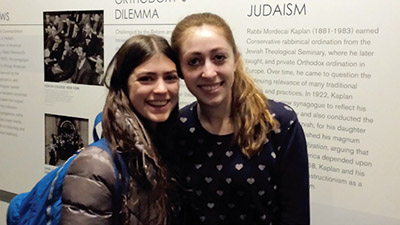



For the third straight year, Joel Glazer, American History teacher at Bruriah, arranged a personalized tour of the National Museum of American Jewish History (NMAJH) in Philadelphia for a select group from his 11th-grade American History classes so they could gain first-hand knowledge of how to curate a museum of their own in Bruriah.
The NMAJH focuses on Jewish life in Europe and America throughout the past century. Bruriah’s museum staff experienced the museum through the lenses of visitors to a museum and also curators.
Under the direction of this year’s curator, Miri Weissman, the junior hallways of Bruriah will soon be transformed into a Holocaust museum, replete with newspaper headlines, original works and installations. All installations are created for the sole purpose of filling this museum.
Along with her assistant curator, Adina Weisel, Weissman will guide her staff of 12 in building an engaging museum that will be open to the public. In addition to Weissman and Weisel, the staff includes Mili Chizhik, Shana Erblich, Shayna Feldman, Elisheva Hirsch, Rina Kamara, Lily Lightman, Maya Ratner, Anya Roberts, Chava Schwartz, Gila Sheinfil and Avital Wiener.
Mili Chizhik inherited the role of head of fundraising. Last year, the 1.5 million penny campaign was completed and the $15,000 distributed to three organizations. As a tribute to Chaya Newman, principal of Bruriah for 37 years, to commemorate her fifth yartzheit, this year’s goal is to begin raising $5,000 which will be awarded to a student in the class of 2019 for use toward her year in Israel.
New to the museum this year is a spiritual component which will feature the various ways Jews maintained their observance and faith. Lily Lightman is tasked with this aspect of the museum and will work under the guidance of Yehudis Levin, grade adviser for the juniors.
Said Weissman, “The experience of visiting this museum amazed us at how Jews could go through so much and become so great. It was also extremely helpful in learning how to orchestrate our own museum.”
She continued, “We saw breathtaking exhibits including an enormous painting of the Auschwitz concentration camp. We also met with the exhibitions manager, who gave us useful tips on organizing a museum. She told us about the importance of spacing, and the use of color and music throughout the museum.”
The brainchild of esteemed history teacher Joel Glazer, the museum evolved after a near-private audience in 2005 with then-prime minister of Israel Ariel Sharon. On a group tour sponsored by the OU that included a meeting with Sharon, Glazer found himself seated next to the prime minister. In response to Sharon’s question, “Does anyone have any questions?” Glazer asked Sharon how he could deal with the way the media outlets portray Israel. Sharon replied, “We’re responsible to keep you safe, you’re responsible for getting out the truth.”










